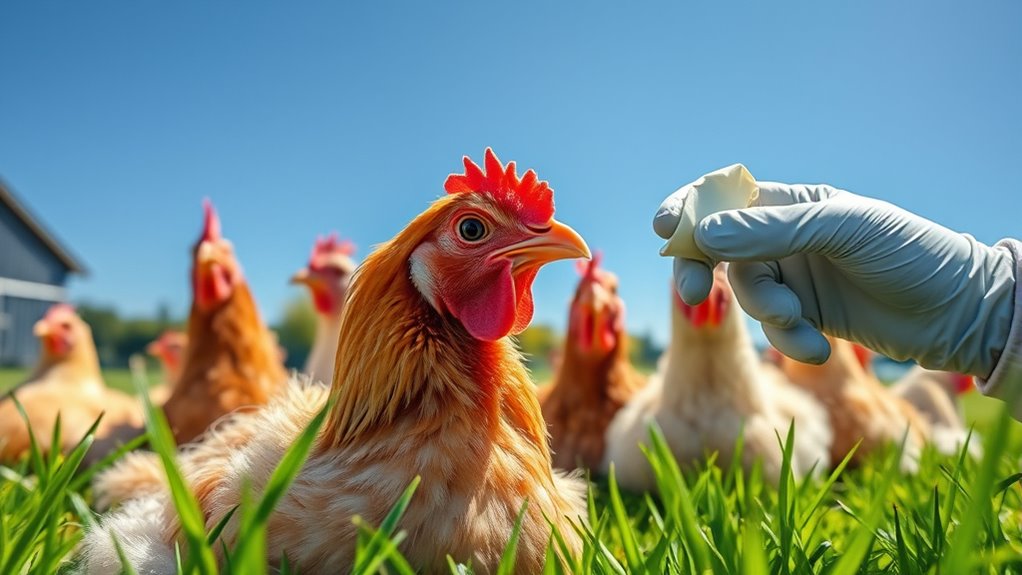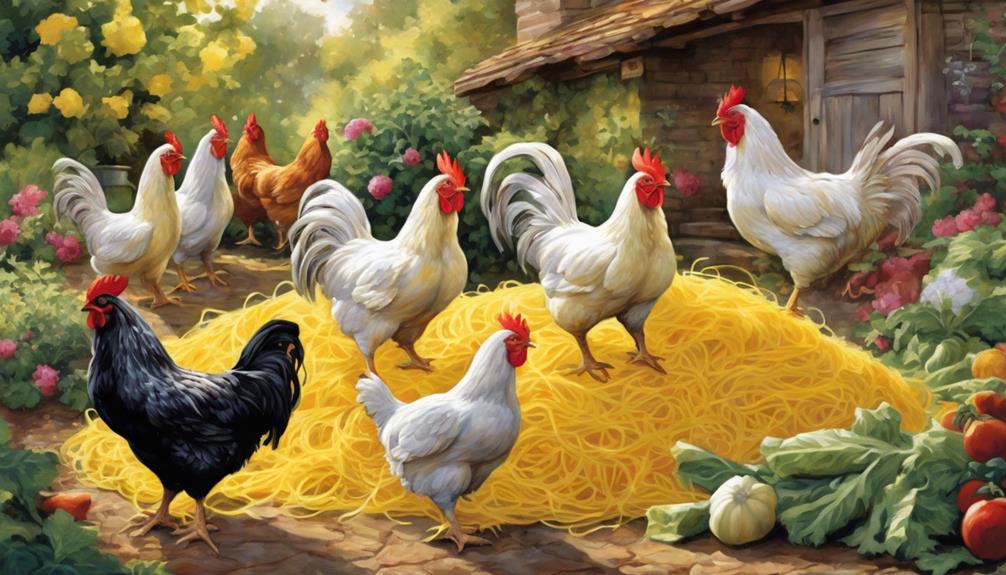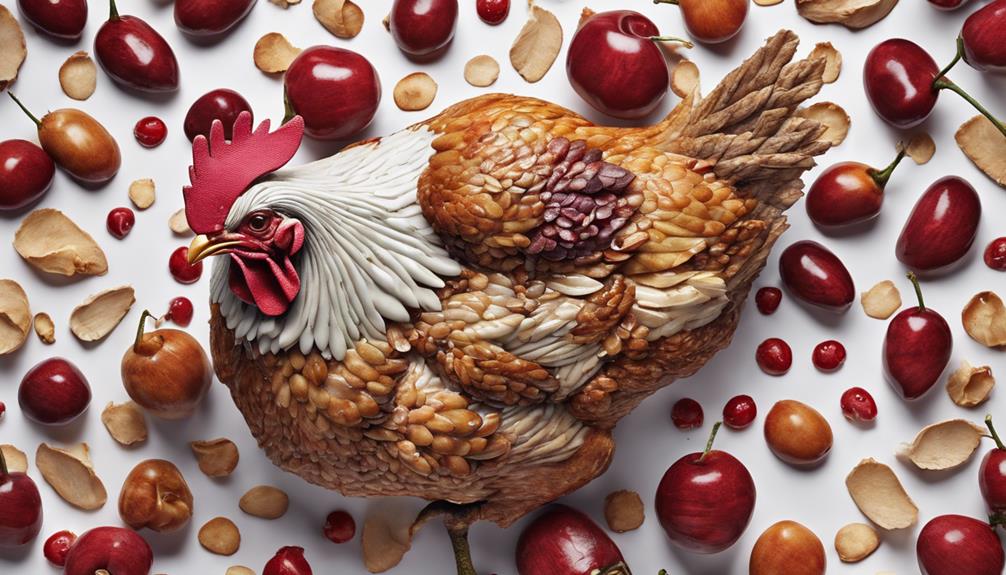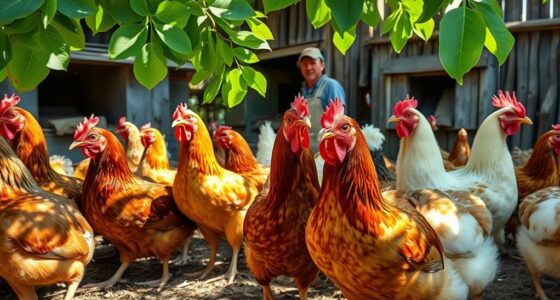Yes, chickens can wear sunscreen to protect their sensitive skin from sunburn and heat stress, especially during hot summer days. Veterinarians recommend using pet-safe, broad-spectrum sunscreens on areas with less feather coverage, like combs and wattles, while avoiding their eyes. Make sure to apply it gently and allow it to absorb fully before letting your chickens outdoor. To learn more about keeping your flock safe in the summer heat, keep going for helpful tips.
Key Takeaways
- Chickens can benefit from pet-safe sunscreen on exposed areas like wattles and combs during intense sun exposure.
- Applying veterinarian-recommended sunscreen helps prevent sunburn and skin damage in chickens.
- Use sunscreen sparingly, ensuring it is free of harmful chemicals and fully absorbed before outdoor activity.
- Providing shade and limiting outdoor time during peak sun hours are essential for chicken sun protection.
- Regularly monitor chickens for signs of heat stress or skin irritation to maintain their health and comfort.
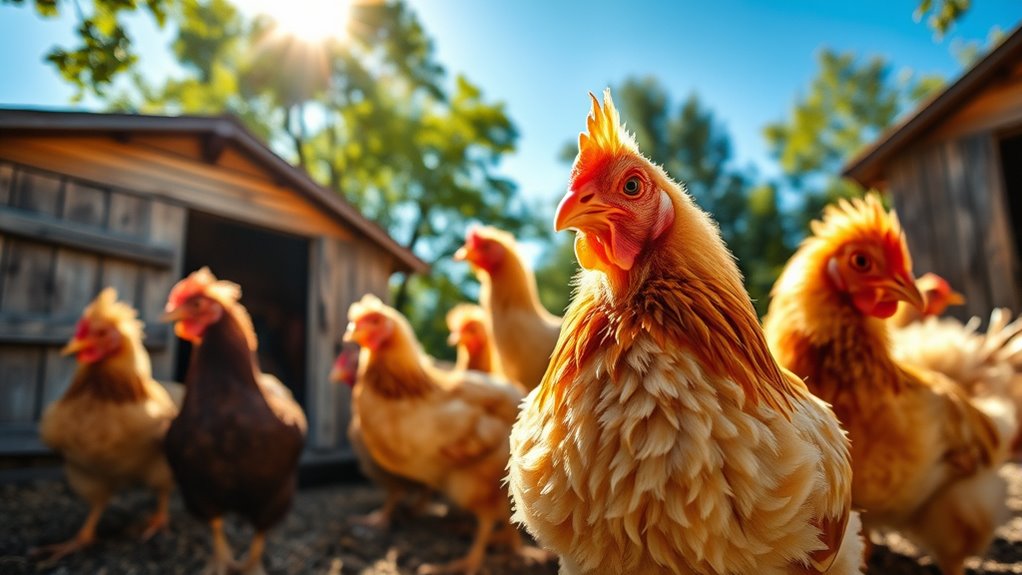
As scientists grow increasingly concerned about the effects of UV rays on animals, some farmers are taking unexpected steps to protect their chickens—they’re now applying sunscreen. While it might sound unusual, poultry sun protection has become a topic of discussion among veterinarians and backyard chicken owners alike. If you’re caring for chickens in your backyard, understanding how to shield them from sun damage is essential, especially during hot summer months when UV exposure is at its peak. Chickens, like humans, can suffer from sunburn, heat stress, and even skin cancer if exposed to too much direct sunlight. That’s why implementing effective backyard chicken care strategies, including sunscreen application, can make a real difference in their health and comfort.
When it comes to poultry sun protection, it’s important to remember that chickens aren’t just small farm animals; they’re living beings with sensitive skin that can burn just like ours. If your flock spends a lot of time outdoors, especially during the hottest parts of the day, consider providing shaded areas where they can retreat. Installing shade cloths or letting them free-range during early mornings or late afternoons helps reduce their sun exposure. Additionally, providing plenty of fresh water is essential, as dehydration can make heat-related issues worse.
Applying sunscreen to chickens isn’t as simple as slapping some on like you would for yourself. Veterinarians recommend using pet-safe, broad-spectrum sunscreens that are free of harmful chemicals. You can gently apply the product to areas with less feather coverage, such as the comb, wattles, and any exposed skin. Be cautious to avoid their eyes and be sure the sunscreen is fully absorbed before letting your chickens resume outdoor activity. Regularly checking these areas for signs of irritation or discomfort is also critical for effective backyard chicken care. Moreover, choosing the right projector technology can enhance your outdoor space, making shaded areas more effective and enjoyable for your flock.
Incorporating poultry sun protection into your routine isn’t just about preventing sunburn; it’s about ensuring your flock stays healthy and stress-free during the summer. If you notice your chickens seem lethargic, are panting excessively, or have reddened skin, it could be a sign they’re suffering from heat stress or sun damage. Taking proactive steps—like providing shade, ensuring hydration, and applying pet-safe sunscreen—helps keep your chickens comfortable and protected. By paying close attention to their outdoor environment and health, you’re practicing responsible backyard chicken care that supports their well-being through the hottest months.
Frequently Asked Questions
Can Chickens Develop Sunburns or Skin Cancer?
Yes, chickens can develop sunburns or skin cancer, especially if their feathering is sparse or missing. To protect them, you should focus on sunburn prevention by providing shaded areas and ensuring they have enough feather coverage. Keep an eye on their skin for redness or burns, and consider applying pet-safe sunscreen if necessary. Proper summer care helps keep your chickens healthy and comfortable during hot weather.
How Can I Tell if My Chicken Is Overheated?
Overheating your chicken feels like a sudden chill despite the heat outside. To spot it, watch for excessive panting, wings spread, or lethargy—signs your bird’s body is struggling to regulate temperature. During chicken grooming, you might notice dull feather health or ruffled feathers, indicating stress from heat. Keep your flock cool and hydrated, providing shade and fresh water to prevent overheating and guarantee their feathers stay healthy.
Are There Specific Sunscreen Brands Safe for Chickens?
When considering a safe sunscreen for your chicken, focus on chicken skincare and avoid human products. No specific brands are designed for poultry, so it’s best to use a non-toxic, pet-safe sunscreen recommended by avian veterinarians. Always test a small area first, and monitor your chicken for any signs of irritation. Prioritize shade and proper ventilation to keep your chicken cool, ensuring their summer comfort without risking harm.
What Signs Indicate My Chicken Needs Shade or Cooler Environment?
You’ll notice your chicken needs shade or a cooler environment when its behavior changes—like panting, spreading wings, or lethargy. Environmental indicators, such as excessive heat, bright sunlight, or limited shade, also signal it’s time to provide a cooler space. Keep an eye on these signs, and guarantee your chickens have access to shade and fresh water to stay comfortable and healthy during hot days.
How Often Should I Reapply Sunscreen on Chickens?
Did you know that chickens can suffer from poultry skin health issues due to sun exposure? For proper chicken sun protection, reapply sunscreen at least every two hours, especially during peak sunlight. If your flock is active outdoors, check their skin regularly for signs of sunburn. Remember, consistent reapplication helps prevent burns and keeps their skin healthy, ensuring your chickens stay comfortable and safe in the summer heat.
Conclusion
Just like us, chickens need protection from the sun’s harsh rays to stay healthy and happy. By applying sunscreen and providing shade, you’re giving them a shield as dependable as an umbrella in a storm. Remember, caring for your feathered friends isn’t just about food—it’s about keeping them comfortable and safe from summer’s sweltering heat. With these tips, you’ll ensure your chickens shine bright without getting burned, turning your coop into a summer sanctuary.
